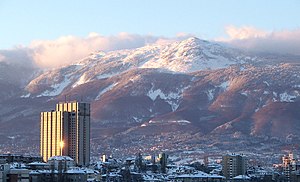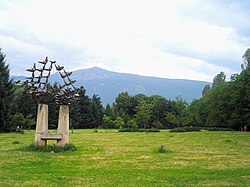Bansko is the birthplace of 20th century Bulgarian poet Nikola Vaptsarov and Bulgarian enlighteners Paisiy Hilendarski (sometimes disputed) and Neofit Rilski.
| BULGARIA - winter resorts |
|
| HOME
| World
Heritage
| Summer Resorts |
Winter Resorts |
Spa Resorts |
Ethnography |
| Old Towns | Thracian Treasures | PhotoPage2 | PhotoPage3 | PhotoPage4 | PhotoPage5 | |
| Bansko
was
founded during the 10th century on the site of an old Thracian settlement.
During the 18th century it was a prosperous place, home to craftsmen,
artists and merchants. Its highly regarded icon painting and woodworking
schools were among the most influential in the country.
Today, Bansko is certainly one of the jewels in Bulgaria's tourism crown. This charming, historic town is located in the broad Mesta River plain, which is bordered by three mountain groups: the Rila, Rhodopes and Pirin. The latter, topped by 2,914-meter Mt Vihren, form a stunning alpine backdrop to the town. Bansko's mountain-influenced climate means relatively short summers and long winters, with an average of 160 days of snow. Like the rest of Bulgaria, Bansko is feeling the pinch from the demise of its state-supported industries, but tourism, hiking and skiing are taking up much of the slack ... more info about Bansko here... - FULL list of Bulgarian mountain and spa resorts... 
 | ||||||||||||||||||||
|
Bansko (Bulgarian:
Банско)
is a town in southwestern
Bulgaria, located at the foot of
Pirin at an altitude of 936
m
above sea level. Today it is a popular mountain resort.
Bansko is the birthplace of 20th century Bulgarian poet Nikola Vaptsarov and Bulgarian enlighteners Paisiy Hilendarski (sometimes disputed) and Neofit Rilski.
Bansko, once mainly a stockbreeding and
traveling merchant community, has nowadays become a center
of winter and summer tourism. The mountain peaks near the
town, the numerous lakes and the old pine woods make it a
popular site for recreation. In recent years, the town has
gained international popularity after the start of the
annual
Bansko Jazz Festival and consequently the annual Bansko
pop-star concert featuring top pop stars. The nearby village
of
Banya, located only 5 km from the town, is known for its
27
thermal mineral springs.
A new gondola lift was built in 2003 to replace a minibus ride up to the ski slopes of Todorka. Several other gondolas and ski lifts are in the process of being built. These developments, along with the construction of extensive housing and recreational facilities around the gondola (which is on the southwest end of the town by the river), have made Bansko a popular and growing destination. |
|||||||||||||||||||
| Borovets BOROVETS is the Alpine resort among Bulgarian winter resorts, providing excellent opportunities for the whole range of winter sports - from the Alpine sports to cross-country skiing, ski-jumps and biathlon. The resort has twice hosted Word Cup Alpine skiing rounds, while its biathlon track is one of the best in the word. The slopes of Borovets have a permanent snow cover, more than a meter and a half thick, from November to May. The air in Borovets is crystal-clear and totally free of any pollutants while the average temperature during January, the coldest month, is minus 4.6 C. EXTENSIVE SKIING FOR ALL ABILITIES: The ski runs of various difficulty are suitable for all, be them beginners, intermediate, advanced or expert skiers. The slopes and runs are maintained in perfect conditions and are designated with international markings and multilingual signs. A snow machine is also available ... more info about Borovets here... Borovets (Боровец), known as Chamkoriya (Чамкория) until the middle of the 20th century, is a popular Bulgarian mountain resort situated in Sofia Province, on the northern slopes of Rila, at an altitude of 1350 m. Borovets is 10 km from Samokov, 73 km from Sofia and 125 km from Plovdiv. Today the resort is a modern ski centre with luxury hotels and an extensive ski course network and has twice been a host of Alpine skiing World Cup competitions. Source: http://en.wikipedia.org/wiki/Borovets | ||||||||||||||||||||
 Borovets | ||||||||||||||||||||
|
Pamporovo (Bulgarian: Пампорово) is a popular mountain resort in southern Bulgaria, one of the most well-known in Southeastern Europe. It is set amongst magnificent pine forests and is primarily visited during the winter for skiing and snowboarding, but is also visited in the summer. The center of Pamporovo comprises a number of excellent hotels and bars. It is also one of the most southern skiing resorts in Europe. The resort is set in the southern Rhodope Mountains at an altitude of 1620 meters above sea level. The highest peak in the area, Mount Snezhanka (1928 m), is several hundred meters higher than the resort. Pamporovo is around 260 km away from Sofia, 85 km south of Plovdiv, 15 km north of Smolyan, and 10 km south of Chepelare. The resort boasts 25 km excellent ski-runs and 38 km
cross-country skiing tracks served by 18 lifts with a total
capacity of 8 500 persons per hour. All ski runs are safe
guarded and maintained in a very good condition. Four
snow-leveling machines and 6 snow cannons guarantee skiers
comfortable and enjoyable downhil rides. More than 100
highly qualified ski instructors fluent in different
languages are here to teach both beginners and intermediate
skiers and snowboarders. Source: http://en.wikipedia.org/wiki/Pamporovo
|
||||||||||||||||||||
Vitosha (Bulgarian:
Витоша
listen )
is a
mountain massif, on the outskirts of
Sofia, the capital of
Bulgaria. Vitosha is one of the symbols of Sofia and the
closest site for hiking,
alpinism and
skiing. Convenient bus lines and rope ways render the
mountain easily accessible. Vitosha has the outlines of an
enormous dome. The territory of the mountain includes
Vitosha
national park that encompasses the best known and most
frequently visited parts. The foothills of Vitosha shelter
resort quarters of Sofia; Knyazhevo quarter has
mineral
springs. Vitosha is the oldest national park in the
Balkans. The mountain emerged as a result of volcanic activity and has been subsequently shaped by the slow folding of the granite rock layers and a series of gradual uplifts of the area. It appears dome shaped at first sight, but the mountain, 19 km long by 17 km wide, actually consists of concentric denudational plateaus rising in tiers one above the other. Vitosha is separated into four main parts whose main ridges gather at a crown known as Cherni Vrah ("Black Peak"). This is the highest point of the mountain at 2290 m and is one of 10 peaks of Vitosha over 2000 m in height. |
||||||||||||||||||||
|
|
||||||||||||||||||||










